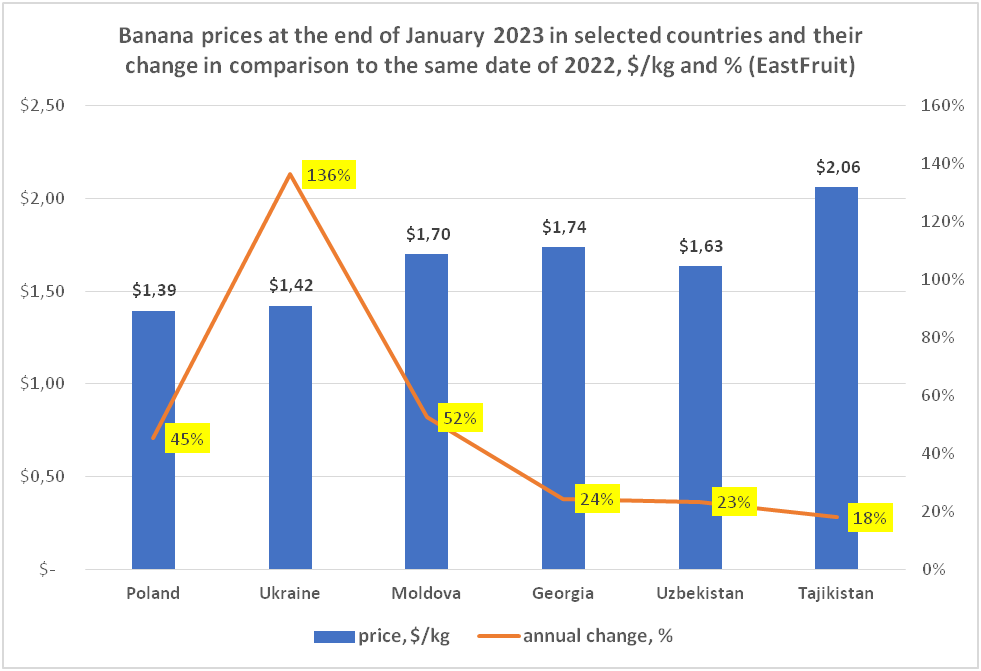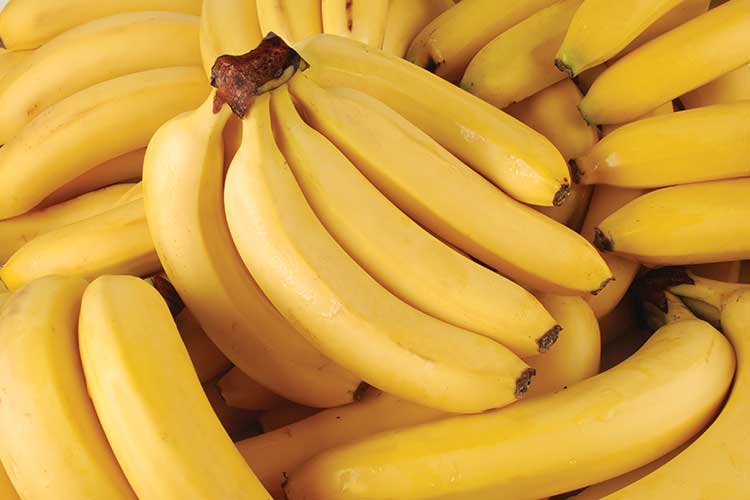According to EastFruit analysts, banana prices increased more than most other fruits on a year as of the end of January 2023, considering produce market situation in Poland, Ukraine, Uzbekistan, Moldova, Georgia and Tajikistan. At the same time the rise in prices in Eastern Europe was much sharper than in Central Asia, where bananas traditionally were much more expensive.
The main reason for price increase in Eastern Europe, primarily in Ukraine and Moldova, was the aggression of Russia and its armed invasion into Ukraine, which led to the blockade of the seaports of Ukraine. This automatically blocked the possibility of importing bananas by sea, which is the most economical way. The seaport blockade of Russian impacted mostly two countries: Ukraine and Moldova. As a result, both Ukraine and Moldova had to import bananas from EU countries by trucks, which significantly increased the costs.
 At the end of January 2022 Ukraine had the lowest wholesale prices for bananas. A year later banana prices in Ukraine increased 2.4 times in local currency and the price level for bananas was equal to that of Poland.
At the end of January 2022 Ukraine had the lowest wholesale prices for bananas. A year later banana prices in Ukraine increased 2.4 times in local currency and the price level for bananas was equal to that of Poland.
This does not mean at all that the price level in dollars grew 2.4 times in Ukraine – it refers to the increase in local currency UAH, which due to Russian was devaluated sharply. In US dollars banana prices in Ukraine increased by 76% on a year – also the highest figure among all countries in the region.
It is not surprising that banana prices in Moldova also increased by more than 50% on a year. However, prices for bananas in Moldova remained significantly higher than in Ukraine although the difference has decreased.
Poland in now a champion in terms of banana price affordability although the difference in price with Ukraine is rather insignificant – only about 3 US cents. The increase in banana prices in Poland was due to the price situation in the world market, including the decline in banana production in Ecuador due to cold weather. Also the increase in the costs of logistics due to the Russian aggression against neighboring Ukraine played a significant role in this.
The price increase for bananas was lowest in Tajikistan, Uzbekistan, and Georgia. In Tajikistan, the local currency strengthened over the year, which contributed to a decrease in the costs of imported products, and, in part, offset the growth in the price of bananas on the world market. Uzbekistan and Georgia continued to actively increase import volumes and improve logistics solutions, which allowed them to obtain better domestic wholesale prices for bananas. In particular, some retailers have switched to importing bananas directly, selling their surplus to the wholesale market, which helped keep prices lower than they could have been otherwise.
However, banana prices in Tajikistan continued to be the highest of any country in the region. Only in this country, wholesale prices for this fruit were above $2 USD per kg at wholesale. Consumption was also the lowest of all of the countries in EastFruit monitoring.
Uzbekistan pleasantly surprised us, as it for the first time bypassed Georgia in terms of banana prices. Why is this unexpected? Uzbekistan is only one of the two double-landlocked countries in the world and its logistics are always rather expensive, as it is one of the most remote countries in the world. On the other hand Georgia has its own ports in the Black Sea and could really import produce at a much lower costs as bananas are shipped by the sea. Therefore, a more competitive price for a banana in Uzbekistan indicates a significant increase in the efficiency of the fresh produce trade in the country.
2023 promises to be a challenging year for the global banana industry. The costs of banana producers have risen sharply, so if global prices for these fruits do not continue to rise, perhaps some of the market players will be forced to leave this business. And here we are not even talking about weather anomalies, wars, and the climate change, which cause even more damage to the industry every year.
Rising prices for bananas, in turn, could lead to lower consumption in countries with high consumption levels. Only in Uzbekistan, Tajikistan, and the countries of Central Asia, where banana consumption is comparatively low, it could continue growing, but the growth rate will be much lower than now.
The use of the site materials is free if there is a direct and open for search engines hyperlink to a specific publication of the East-Fruit.com website.




